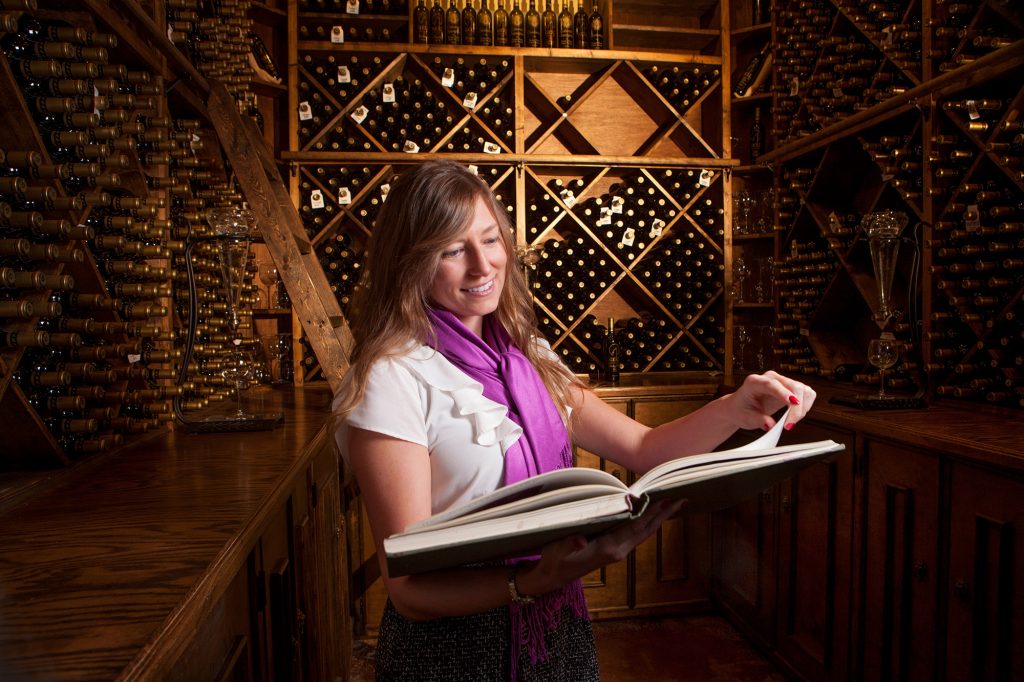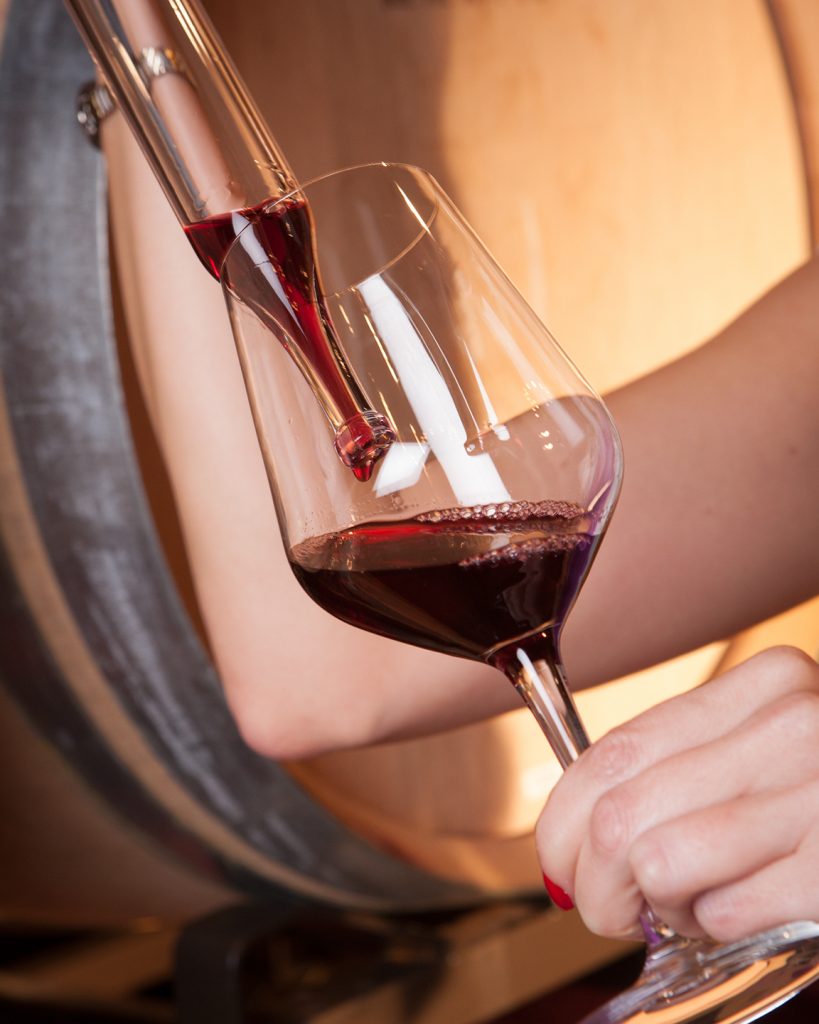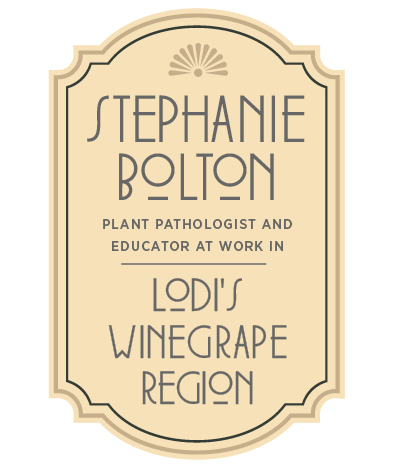Where are They Now?
By: Cynthia Adams | Photos By: Nancy Evelyn
Just as she predicted while at UGA, Stephanie Bolton is moving steadily toward her dreams. Meanwhile, she travels with a backpack filled with former UGA texts and notebooks as she helps California winegrowers in Lodi fend off viruses.
Double Dawg Stephanie Bolton’s professional life encompasses a strong education and research component—as she also balances the goal of serving as a wine educator in the massive Lodi region in her role as a director for the Lodi Winegrape Commission. Lodi wine country, which encompasses 110,000 acres of wine grapes, is located between the San Francisco Bay and the Sierra Nevada mountains. The physical area comprising Lodi is much larger.
Bolton’s career achievements are no surprise to those who knew Bolton back in Georgia. While attending the Graduate School’s Emerging Leaders workshop in 2014, the plant pathologist had indicated the twin, complementary interests.
“I will be a Wine PhD,” she had written during the workshop, “a wine researcher and a professional wine educator, with a study abroad program for American university students.”
She has been rapidly checking off boxes since—having earned her doctorate three years ago. In 2016, Bolton was named the grower communications and sustainable winegrowing director for the Lodi Winegrape Commission in Lodi, Ca., immediately after completing a doctoral degree in plant pathology, focusing upon grapes and wine.
(She was featured in the Winter 2015 issue of this magazine.)
Since taking on a comprehensive role that involves both grower and public engagement, Bolton’s outreach and educational role at the Lodi Winegrape Commission requires her to be involved on many fronts.
As a director with the commission, she is the primary conduit of critical information, providing Lodi winegrape growers with advanced grower news and resources, while playing a supportive role in expanding Lodi agritourism. She also educates growers concerning the LODI RULES sustainability program. The sustainability effort is a particularly “rigorous” one, she says.
Lodi is sometimes (“unfairly” Bolton says) eclipsed by Napa and Sonoma as tourist destinations most commonly associated with California’s wine industry.
Industry observers agree with Bolton. “Lodi rising,” announced a headline in a California paper last summer. “The region’s wines are taking off and the world is watching.”
Lodi is among California’s most diverse winegrape regions.

Stephanie Bolton leads outreach and educational efforts for the Lodi Winegrape Commission in California, providing Lodi winegrape growers with key resources. Bolton’s work places special emphasis upon sustainability in what is now California’s most diverse winegrape growing region. Photo taken in the wine library at Wolf Mountain Vineyards.
It also has one of the state’s highest planted acreages within the designated winegrape growing regions known as an AVA, or American Viticultural Area. It was designated a wine growing area in 1986. Lodi’s 110,000 acres compares to Napa’s 45,000—an astonishing fact given Napa’s dominance in the public mind.
Its acreage surprises agritourists, who may be familiar with Napa and Sonoma but may overlook a larger winegrowing area producing an impressive range of wines.
While it is best known for old-vine Zinfandels, the region supports a wide diversity of varietals, including Gewürztraminer. “Lodi has 110,000 acres of vineyard with 85 wineries,” Bolton emphasized, while in Georgia and North Carolina during the summer.
She has been developing ongoing ideas to boost the public awareness of Lodi, while simultaneously creating and implementing grower support programs to help growers battle several aggressive challenges faced by winegrowers world wide.
Bolton, who relishes her role as an educator, devotes much of her work life to the technical aspect of her position.
What is Lodi Rules?

Bolton syphoning wine from barrel in the barrel room at Wolf Mountain Vineyard. Bolton is a Plant Pathology student whose primary focus is wine (and grapes).
LODI RULES for Sustainable Winegrowing is California’s original sustainable viticulture program. This program truly began from the ground up, with grape growers deciding it was important for the future of the Lodi region. “Our certification process is rigorous, based in science, voluntary, and third-party accredited and audited. LODI RULES certified growers make up an innovative community with a history and commitment to farming quality winegrapes through the implementation of viticulture practices that balance environmental, social, and economic goals. LODI RULES is designed to communicate their commitment to sustainable agriculture to wineries and the general public.”
Recently, Bolton secured a grant for a virus outreach effort, working with leafroll, red blotch and fanleaf viruses. Mealybugs are a vector for leafroll virus, serving as a sort of canary-in-the-mine function. A mealybug infestation frequently precedes the virus infection.
Argentine ants compound the issue by protecting the mealybugs.
“Grapevine viruses are a problem for all of California and several other wine regions in the world,” Bolton explains, since the viruses and pests are not specific to Lodi. She stresses that Lodi is taking proactive steps regarding viruses.
“We are leading the charge in farmer outreach for this problem!” She addresses both vectors and viruses in working with hundreds of growers.
To this end, Bolton stays in close communication with growers in order to better arm them with the latest information concerning issues that can compromise production. In the case of leafroll, “sometimes grapes won’t ripen.” Issues must be assessed case-by-case.
As the main liaison for the Lodi Winegrape Commission, Bolton is further responsible for organizing monthly breakfast meetings with Lodi growers in order to discuss pathologies and other grower concerns. In these face-to-face interchanges, viruses are a central focus, she says. She also prepares additional grower meetings solely focused upon mealybugs.
When she travels to other countries in conducting research, Bolton’s UGA background is an essential. She literally travels with it in fact-seeking forays with fellow pathologists and growers around the globe. A leafroll expert in Pretoria, South Africa, has been sharing professional information and advice with Bolton. She cultivated the expert advice in order to share and disseminate information, and seeks to create an educational support system.
“I have a backpack with old virus texts,” she explains. Bolton uses the well-worn texts as a valuable reference, and frequently creates her own booklets on specific topics affecting Lodi-area growers.
While a doctoral student at UGA, Bolton studied fungi isolated from Vitis vinifera vineyards in the southeastern United States and surveyed mycotoxins in red wine.
Bolton also holds a master’s degree in Food Science from UGA, and a bachelor’s degree in Chemistry from Wake Forest University.
As for future plans, Bolton is putting together a California wine-making experience, and hopes eventually to create a viticulture/agritourism center with classrooms, opportunities for interns, and wine tastings.
For More Information:
LODI RULES Sustainable Winegrowing Program
· Grower resources and relations
· Viticultural research in Crush District 11
· CD11 Lodi PCA Network Breakfast Meetings
· Mealybug Biocontrol, Grapevine Viruses, and Grapevine
Rootstock Research Focus Groups
· Vineyard Supplier Directory
· EAS impact units
· Lodi Winegrower’s Workbook
· Weather Stations
Lodi Wine Country
Located between the San Francisco Bay and the Sierra Nevada Mountains lies Lodi Wine Country, a region quickly emerging as one of California’s most exciting wine destinations. Over the past decade 4th- and 5th-generation winegrowers dedicated to the soils and vines have brought creative winemaking and cutting-edge technology to the region, catapulting Lodi into the spotlight.
Lodi is predominately a red winegrowing region, with approximately two-thirds of the acreage dedicated to red varieties. Lodi is home to all of California’s leading varieties, and has long been the leading producer and California’s best kept secret for Cabernet Sauvignon, Chardonnay, Merlot, Sauvignon Blanc and Zinfandel. However, with over 100 varieties now in production, Lodi offers a vast portfolio of diverse and interesting wines.









